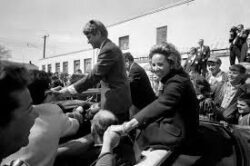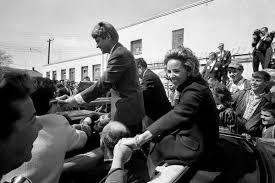The Kennedy Ideal
Ethel Kennedy’s death recalls a time when hope and idealism triumphed over hate and fear.
Robert and Ethel Kennedy were noisy, passionate and boisterous, a contrast to cool, stylish and sophisticated Jack and Jackie.
But the two very different brothers became “the Kennedys” who stood down the Soviet Union in Cuba and stood up for civil rights in the South.
Their stand for racial fairness earned them the hatred of many people I knew growing up in Raleigh.
As attorney general, RFK had a reputation as the President’s “ruthless” enforcer.
After his brother’s death, he became more reflective and empathetic. He was drawn to people who were left out and left behind.
When he ran for President in 1968, he had support from young people, poor people, Blacks and law-and-order Whites.
Many college students were for Gene McCarthy. I was a Kennedy man.
The night of the California primary, I went to my parents’ house to watch the results. My basement apartment didn’t have a TV.
I went to bed after Kennedy declared victory. My father woke me up to tell me he’d been shot.
The meanness and mendacity of Trump and MAGA remind me of what Kennedy said to a crowd of Black residents in Indianapolis the night Martin Luther King was assassinated:
“Let us dedicate ourselves to what the Greeks wrote so many years ago: to tame the savageness of man and make gentle the life of this world.”
Sadly, that ideal doesn’t live on today in Robert F. Kennedy Jr. That acorn fell from the tree, rolled down the hill and went off the cliff.
But the Democratic Party this year offers candidates who believe – as John and Robert Kennedy did – that politics can be a noble endeavor, candidates who bring people together, instead of dividing them; who lift everyone up, instead of beating us down.
Candidates like Kamala Harris, Tim Walz, Josh Stein, Rachel Hunt, Jeff Jackson and many more.
This year, in this election, we can renew the Kennedy ideal.
Hope can triumph over hate, just as it did 60 years ago.
Photo from The New York Times: Ethel and Robert Kennedy campaigning in 1968.

The Kennedy Ideal

Ethel Kennedy’s death recalls a time when hope and idealism triumphed over hate and fear.
Robert and Ethel Kennedy were noisy, passionate and boisterous, a contrast to cool, stylish and sophisticated Jack and Jackie.
But the two very different brothers became “the Kennedys” who stood down the Soviet Union in Cuba and stood up for civil rights in the South.
Their stand for racial fairness earned them the hatred of many people I knew growing up in Raleigh.
As attorney general, RFK had a reputation as the President’s “ruthless” enforcer.
After his brother’s death, he became more reflective and empathetic. He was drawn to people who were left out and left behind.
When he ran for President in 1968, he had support from young people, poor people, Blacks and law-and-order Whites.
Many college students were for Gene McCarthy. I was a Kennedy man.
The night of the California primary, I went to my parents’ house to watch the results. My basement apartment didn’t have a TV.
I went to bed after Kennedy declared victory. My father woke me up to tell me he’d been shot.
The meanness and mendacity of Trump and MAGA remind me of what Kennedy said to a crowd of Black residents in Indianapolis the night Martin Luther King was assassinated:
“Let us dedicate ourselves to what the Greeks wrote so many years ago: to tame the savageness of man and make gentle the life of this world.”
Sadly, that ideal doesn’t live on today in Robert F. Kennedy Jr. That acorn fell from the tree, rolled down the hill and went off the cliff.
But the Democratic Party this year offers candidates who believe – as John and Robert Kennedy did – that politics can be a noble endeavor, candidates who bring people together, instead of dividing them; who lift everyone up, instead of beating us down.
Candidates like Kamala Harris, Tim Walz, Josh Stein, Rachel Hunt, Jeff Jackson and many more.
This year, in this election, we can renew the Kennedy ideal.
Hope can triumph over hate, just as it did 60 years ago.
Photo from The New York Times: Ethel and Robert Kennedy campaigning in 1968.